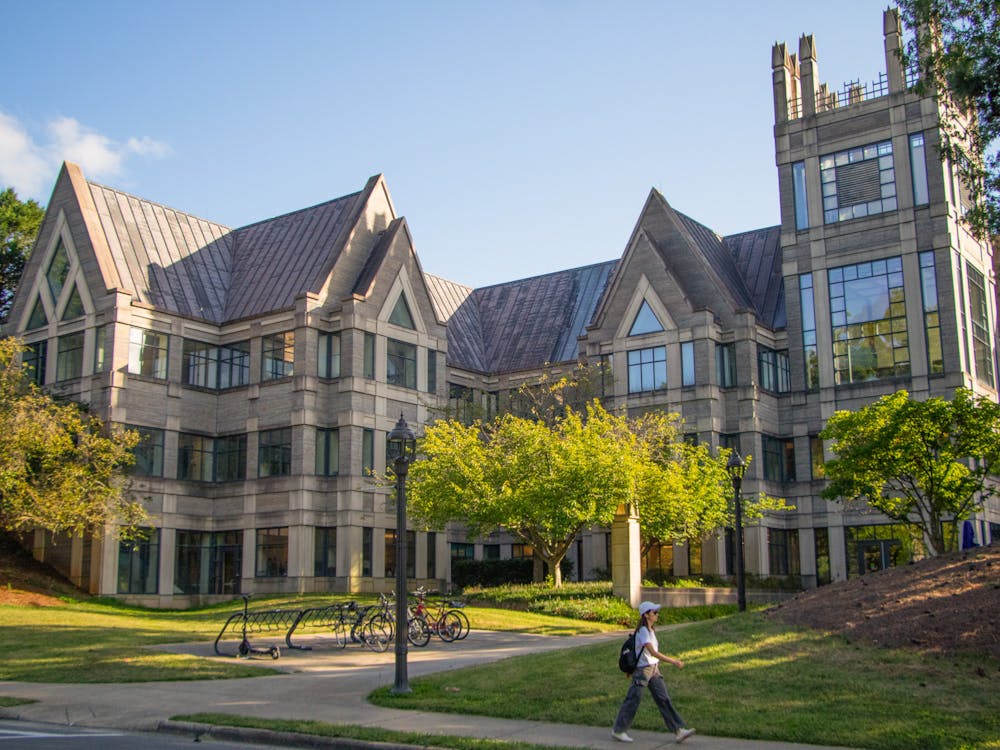The Duke Center for International Development has paused its activities amid cuts to the United States Agency for International Development (USAID), marking a major development in the University’s response to reductions in federal funding.
Housed within the Sanford School of Public Policy, DCID oversaw projects promoting sustainable development across the world through education, research and advocacy — many of which were funded by USAID. According to Edmund Malesky, DCID director and professor of political science, Sanford leadership paused the center’s activities “because [DCID] did not have an alternative funding model in place.”
“The closure of USAID was painful for us. We had a few projects that lost ongoing funding but also lost opportunity for future funding,” Malesky wrote in a Thursday email to The Chronicle.
He added that DCID’s staff and labor are being relocated to “other school priorities.” University administration and Sanford leadership did not respond to The Chronicle’s request for clarification on whether any staff or faculty would be laid off.
The move follows a March 13 email to faculty and staff from President Vincent Price outlining cost reductions and a strategic realignment across the University.
“While we are evaluating targeted cost-saving measures across the institution, due to the evolving federal funding landscape, we are planning for a future with a very different funding model [than] in the past,” wrote Frank Tramble, vice president for communications, marketing and public affairs, in a Friday email to The Chronicle. “… This remains an ongoing planning process, and we are committed to keeping our community informed as it progresses.”
Manoj Mohanan, interim dean of the Sanford School of Public Policy, wrote in a Friday email to The Chronicle that DCID staff “are continuing to work in support of Sanford’s joint missions of education, research and policy engagement,” adding that the school is reviewing its operations in line with University-wide cost-cutting efforts.
Many of DCID’s projects were funded through USAID, including ones quantifying the effects of climate change on internationally displaced people and examining political will in anti-corruption efforts. One of its longest-standing projects was also one of the most impactful in USAID’s history, generating significant economic reform and a robust relationship with a new Southeast Asian trading partner: Vietnam.
The project — led by Malesky — was launched in 2005 by the Vietnam Chamber of Commerce and Industry with funding from USAID. It introduced the Provincial Competitiveness Index (PCI), which assesses business conditions, economic governance and administrative reform efforts at the provincial level. The PCI helped inform Vietnamese partners on how to create a business environment that fosters development of the private sector. The nation has been a unitary state under the Communist Party of Vietnam since the Vietnam War.
Throughout the project’s tenure, Malesky made nearly 100 visits to Vietnam, working directly with provincial officials and business leaders.
“I will never know Vietnam as well as Vietnamese policymakers or Vietnamese businesses, and my job isn't to tell them what to do,” Malesky said in a March 18 interview with The Chronicle, prior to the pause of DCID’s activities. “But the way I see development is my job is to … [use] scientific research skills to provide data that [partners] can use to make their own decisions, and I can draw on international experiences to tell them what has worked … in other locations.”
The PCI was integrated into Vietnam’s anti-corruption law as its primary method of assessment.
“It has been gratifying to see our recommendations for how to improve be enshrined in Vietnamese law, or to see the government use our initiatives in speeches when advocating for certain policies, or to see private businesses use our index when advocating for reforms with the Vietnamese government,” Malesky said.
Despite its impact, the project came to an abrupt halt this year when the U.S. government issued a stop order, followed by a cancellation order. The PCI’s corresponding webpage on the USAID site was removed, and the U.S. Department of State webpage detailing U.S.-Vietnam cooperation has been archived. The future of such initiatives remains uncertain.
“A lot of the things that we were doing, I think eventually that people are going to understand their value and they'll start working on them too, and maybe they'll be funded by other organizations,” Malesky said. “But at least, I think, for the next four years, I'm not anticipating them coming back.”
Get The Chronicle straight to your inbox
Sign up for our weekly newsletter. Cancel at any time.
Ana Despa is a Pratt sophomore and an associate news editor for the news department.

